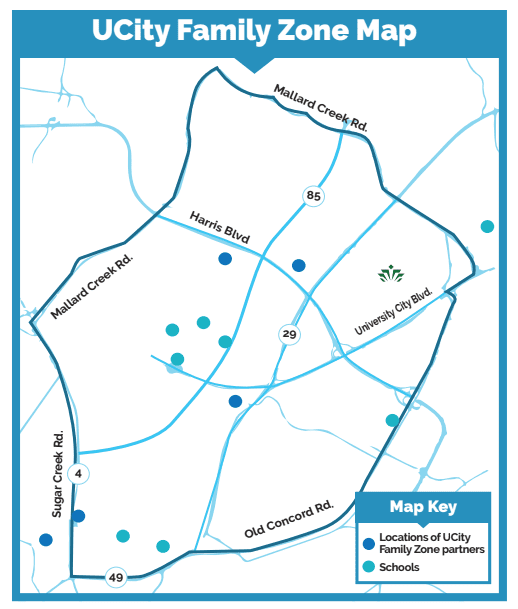UCity Family Zone

What
The UCity Family Zone is a place-based partnership for improving the social determinants of health and quality of life in the University City communities. Through collaboration with a wide range of community partners, the UNC Charlotte seeks to improve the daily living, learning, and working conditions of individuals and families throughout the community by addressing the social determinants of health. The UCity Family Zone is a continuous geographical area surrounding UNC Charlotte, is comprised of multiple organizations, and is home to 45,000 residents in an area of 5.5 square miles. Contributing members include UNC Charlotte, community non-profits, businesses, schools, public and quasi-governmental organizations, and faith-based organizations. The College of Health and Human Services provides administrative leadership, research expertise, and program evaluation support through ARCHES and the Community Action Research Scholars (CARS) program.
A UNC Charlotte Priority
The UNC Charlotte Civic Action Plan has identified the UCity Family Zone to be one of the community engagement zones of focus for the university. These zones are designed as a geographic focus for multi-year interdisciplinary university-wide initiatives with common themes and shared agendas responsive to the community’s needs.
Mission
As a collective impact organization UCity Family Zone seeks to align the activities of its member organizations to achieve the greatest impact through:
- A common agenda
- Shared measurement systems
- Mutually reinforcing activities
- Continuous communications and
- Support by ARCHES as the backbone organization.
Goals:
- To improve the daily living, learning, and working conditions of individuals and families throughout the community by addressing the social determinants of health.
- To co-develop neighborhood physical and social structures that promote individual and community resilience.
- To enhance social capital by advocating for equity in housing, education, health, income, and hunger.
- To empower individuals and families with the skills and resources needed to achieve and sustain health and social equity.
- To assess neighborhood assets and needs, and measure the impact of individual, family, and collective actions on improving quality of life.
Current Projects
During 2018-2019 the UCity Family Zone has undertaken numerous actions in support of its mission and goals including
- Through a grant from University City Partners and the Knight Foundation, provided support to the Charlotte Action Research Project (CHARP) to begin asset-based community development (ABCD) in the Hidden Valley neighborhood
- Convened 12 meetings attended by representatives of more than 25 public, private, and non-profit organizations to discuss existing community assets and gaps in services
- Conducted the first ever study of resilience and mental health among recent Latinx immigrants, through a partnership between UNC Charlotte and Camino Community Center
- Undertaken program evaluations or implemented programs, conducted by Community Action Research Scholars (CARS) with Atrium Health – University, Heal Charlotte, Communities Doing Good, INC, Men of Destiny, and Camino Community Center
- Conducting a comprehensive survey of organizations and developing an ecosystem map of health and human services available in the UCity Family Zone, including existing partnerships
- The first recipient of the UCity Family Zone Fellowship developed and implemented a motivational seminar series for participants in the My One Dream program through Communities Doing Good, INC
Why This Work Matters
Poverty contributes to a lack of choices, lack of control and feelings of powerlessness, depression and poor health. It is estimated that 80% of chronic disease is preventable and 70% of all premature deaths result from social factors. By addressing the social determinants of health in the low-income communities in the UCity Family Zone, the partnership seeks to reduce and eliminate poverty-based health and social inequalities and improve equity.
The social determinants of health refer to “the structural determinants and conditions in which people are born, grow, live, work, and age,” and they have a profound effect on the physical health, and social and economic wellbeing of individuals, families, neighborhoods, and communities. They are grouped into 6 primary areas, each consisting of multiple components: 1) economic stability, 2) neighborhood and physical environment, 3) education, 4) food, 5) community and social context, 6) health care system (see Figure 1).
Demographics of UCity Family Zone
The UCity Family Zone consists of 45,426 residents; individuals in this area are at the highest risk of poverty-related illnesses and risk of early death due to social and demographic characteristics of the population, including:
- Household income – $38,961 (County, $56,854)
- Race and ethnicity – African-American (44%), White (26%), and Latino (19%)
- Age of death – 67 years (County, 71 years)
- Bachelor’s Degree – 30% (County, 42%)
- Test proficiency in Elementary School – 36.6% (County, 51.2%)
- Test proficiency in Middle School – 26.8% (County, 44.4%)
- Test proficiency in High School – 30.2% (County, 50.4%)
- Home ownership – 33% (County, 57%)
- Rental houses – 30% (County, 22%)
- Single Family Housing – 36% (County, 60%)
- Property crime – 61.4 crimes per 1,000 people (County, 31.8)
- Sidewalk availability – 35.5% (County, 42.5%)
Who
The following organizations and community leaders are instrumental in guiding the activities of the UCity Family Zone in their respective content areas:
- ARCHES – Backbone Support
- Atrium Health-University – Food and Hunger
- Camino Community Center – Health Care
- Communities Doing Good, Inc. – Workforce and Income
- Mayfield Memorial Baptist Church – Housing and Homeless
- Leadership in the Clouds – Social Capital
- University City Connect – Education
- University City Partners – Partnership Liaison
- Heal Charlotte – Afterschool Programs
- UCity Civic and Faith Leaders Group – Volunteer support and engagement
Want to get involved?
Is your organization interested in joining the UCity Family Zone or would you like additional information? Click here to fill out an interest form. Faculty, staff, students or community members should reach out directly to Keri Revens, UCFZ Program Manager.
Contact us:
Mark DeHaven, Ph.D. Keri Revens, CHES, MS
ARCHES Director UCity Family Zone Program Manager
mark.dehaven@uncc.edu kellio15@uncc.edu